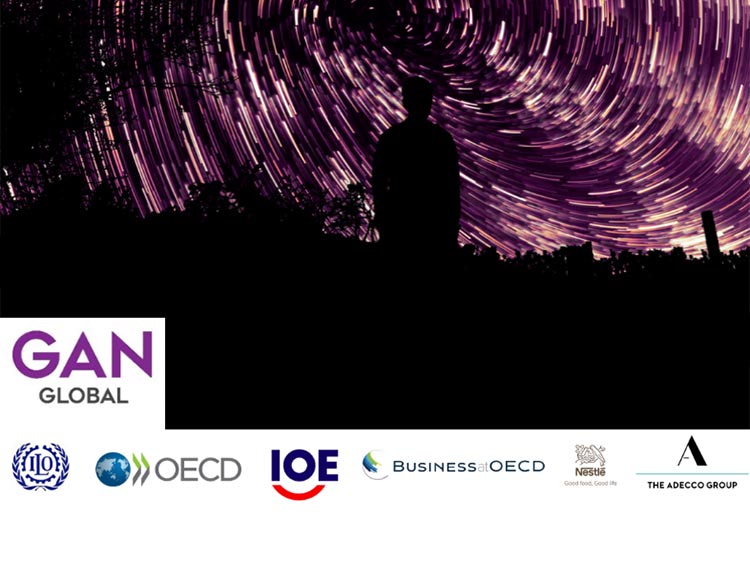Helping a “lockdown generation” transition to labour markets post COVID-19

As GAN Global (@GAN4Skills) “What can we do to collectively help a #LockdownGeneration transition to labour markets post COVID-19?” is the main issue we wanted to address with high-level stakeholders from public and private spheres and youth representatives from across the globe (Online discussion – 17 July 2020).
A deep economic and social crisis is linked to the COVID-19 pandemic; all of the speakers in the discussion agreed that innovative approaches are required to ensure youth have access to work-based learning opportunities, as a viable pathway towards a decent job.
For several groups, especially the marginalised and youth, across all countries and several sectors, 2020 is a year that marks lost economic, educational and labour opportunities.
Building bridges between policymakers, governments, and the private sector to improve employability
GAN Global is an organisation that aims to build bridges between policymakers, governments, and the private sector to improve employability, through work-based learning opportunities, including apprenticeships.

As COVID-19 has posed a huge burden on youth and future working generations due to lost opportunities in learning and employment, we brought together major stakeholders to explore solutions to the challenges that today’s generation is facing.
The Organisation for Economic Co-Operation and Development (OECD) estimates that GDP decreased by 15% in member countries between the fourth quarter of 2019 and the second quarter of 2020, according to Ludger Schuknecht, Deputy Secretary-General. If there is a further pandemic wave leading to a second lockdown, unemployment could rise to 12.6% by the end of 2020.
Calling it possibly the worst crisis since WWII, Alette van Leur, Officer in Charge of the Policy Portfolio and Director of Sectoral Policies of the International Labour Organization (ILO), cited the ILO Monitor’s findings with one in six youth having to stop work since the onset of the pandemic.
She also urged the need for comprehensive, inclusive and forward-looking policy responses to support youth through the COVID-19 pandemic and beyond to avoid the emergence of a “lockdown generation” and to prevent long-lasting damage to young people.
In its flagship Employment Outlook 2020 Report, the OECD presents a sobering outlook where member countries went from a record-low unemployment rate of 5.2% in February 2020 to 8.5% by April, edging down to 8.4% in May. The youth unemployment rate was even worse, spiralling from 11.2% to 17.6% in three months, following a loss of 4 million jobs held by young people.

“In a matter of three months, COVID-19 wiped out the labour market progress achieved over 10 years after the financial crisis”, according to Mr Scarpetta.
The term “lockdown generation” and the lasting “scarring effect” was coined by the ILO who has been examining the impact on youth employment since March.
In its fifth edition of its World Employment and Social Outlook report, the ILO is examining two main factors, the impact of lockdown measures and how these measures are affecting employment and working hours. Sangheon Lee, Director of the ILO’s Employment Policy Department, sees a huge disruption in supply.
Shifting the world of work – Long-term Transformations
 Many of the speakers noted that COVID-19 has accelerated trends in the workplace that were already underway. For youth, this could be an opportunity to leverage. In The Adecco Group’s study, “Resetting Normal: Defining the New Era of Work”, 69% want more digital upskilling.
Many of the speakers noted that COVID-19 has accelerated trends in the workplace that were already underway. For youth, this could be an opportunity to leverage. In The Adecco Group’s study, “Resetting Normal: Defining the New Era of Work”, 69% want more digital upskilling.
The study also revealed an appetite for more time flexibility, an overall belief that jobs will be more accessible and that there will be more measures to increase inclusion and diversity – all key factors that are important for youth, according to Bettina Schaller, Director of Group Public Affairs.
Ms Schaller also cites one of the findings of the #CtheFuture Adecco Group research of 2019, in which 5’000 Gen-Zers were asked what the future of the C-suite looks like. They believe that future CEOs may not need a University degree, showing a shift in mindset that other pathways to work can be achieved outside of traditional educational modes.
According to Ms Schaller, “the Environmental, Social, Governance (ESG) narrative is important for youth and is shifting the world of work”.
On an individual level, Mr Roberto Suarez-Santos, GAN Secretary and Secretary-General of the International Organisation of Employers (IOE) referred to leveraging lifelong learning opportunities for the need to upskill as more pertinent than ever.
“What we have seen last year as coming trends have now become reality. The way we work, how we work, and when we work have been deeply transformed”, according to Mr Suarez-Santos.
A new normal needs to be a better normal – Targeted Solutions
For business, what this means is that they should offer more work-based learning programmes, recognise project output, not time input, and other modes of education, as cited by Ms Schaller.
Mr Schuknecht underlined countries’ responsibilities to maintain links between youth and labour markets to support school to work transitions.
He called on companies’ important role in hiring new graduates and offering work-based learning opportunities to young people thereby “contributing to our prosperity. The only way we can build more resilient, sustainable and inclusive economies is by supporting young people”.

Ms van Leur gave examples of the work that the ILO is supporting, including skills guarantees, and advises these schemes for sectors that are the most impacted such as tourism and retail.
One area that the pandemic has magnified is the importance of digital learning, which Ms van Leur suggests considering as a long-term, and not just a short-term approach.
Quoting ILO Director-General, Mr Guy Ryder, “A new normal needs to be a better normal”.
 Sidra Khan, a youth representative from the Punjab Board of Investment & Trade, reminded stakeholders of the UN’s goal to create 600 million jobs over the next fifteen years. She calls upon multi-stakeholder institutions to target and scale their activities and provide more assistance to developing countries.
Sidra Khan, a youth representative from the Punjab Board of Investment & Trade, reminded stakeholders of the UN’s goal to create 600 million jobs over the next fifteen years. She calls upon multi-stakeholder institutions to target and scale their activities and provide more assistance to developing countries.
In OECD countries, Mr Scarpetta cited trillions of dollars already being directed towards support measures, for individuals, households, and companies, and noted that we need to move from understanding what the problems are to taking action. He gave several country examples of measures targeted for youth and students.
In Denmark and Germany, companies were offered subsidies to maintain their apprenticeships. In Canada, summer job programmes which provide wage subsidies for youth were extended, while France is considering a reduction in employer contributions for young workers. In some countries such as Turkey, Russia, and Indonesia, around half of upper and upper-secondary students are enrolled in VET programmes.
All stakeholders including governments, schools, youth organisations, employers, civil society, and social partners need to take responsibility and contribute to supporting young people, suggested Mr Scarpetta.
The magnitude of the response, should match the magnitude of the crisis
The ILO is focusing on policy measures that stimulate supply. Mr Lee gave examples such as dialogue with employers to develop workforce solutions, employment guarantee schemes and specific policies targeted for youth and educational and training institutions. Russel Mills, Secretary-General of Business at OECD, gave examples of their work cooperating amongst members and sharing best practices, which could be a great way to incite businesses to develop more work-based learning opportunities. He envisions a future where companies’ investment in people becomes a core part of their business strategy.
 Natalie Mukundane, Executive Chair of the African Youth Commission, reminded stakeholders that only half of working youth have access to decent employment. We need to consider more marginalised youth, including those with disabilities.
Natalie Mukundane, Executive Chair of the African Youth Commission, reminded stakeholders that only half of working youth have access to decent employment. We need to consider more marginalised youth, including those with disabilities.
With access to digital learning a huge obstacle in many countries, especially for those in Africa, Ms Mukundane called on stakeholders to pressure governments to ensure access to digital needs. She cited leveraging CSR departments of large companies to provide hardware so that vulnerable youth can also be prepared for the Future of Work.
 The magnitude of the response, should match the magnitude of the crisis, as pointed out by Laurent Freixe, Chair of GAN Global and CEO, Nestlé Zone Americas.
The magnitude of the response, should match the magnitude of the crisis, as pointed out by Laurent Freixe, Chair of GAN Global and CEO, Nestlé Zone Americas.
In the aftermath of the global financial crisis, it took too long to put in place comprehensive measures, and too many young people were unable to continue their studies or engage in work-related activities, said Mr Scarpetta.
We need to implement, without delay, comprehensive measures that give each young person a path to follow.
 One key policy recommendation emerging from this crisis is to ensure that resources are not diverted out of skills investments and human resources, according to Mthunzi Mdwaba who is the International Organisation of Employers (IOE) Vice-President to the ILO.
One key policy recommendation emerging from this crisis is to ensure that resources are not diverted out of skills investments and human resources, according to Mthunzi Mdwaba who is the International Organisation of Employers (IOE) Vice-President to the ILO.
“Equal access to opportunities is key. Skills are a bridge towards social justice”, added Mr Mdwaba.
He referred to the ILO Centenary Declaration, which calls on a human-centred approach, as more urgent than ever. Mr Freixe added that it is a huge mistake to cut out investing in people and incited employers to keep and strengthen training for employees.
Mr Freixe’s main message to employers is to not cut back on their workforces – “if we can each take in one more apprentice, intern or trainee, this can lead to millions of new opportunities. We all have a role to play in finding solutions for youth, and society overall.”







Responses